人教版(2019)必修第二册Unit 4 History And Traditions Discovering Useful Structures课件(共15张PPT)
文档属性
| 名称 | 人教版(2019)必修第二册Unit 4 History And Traditions Discovering Useful Structures课件(共15张PPT) | 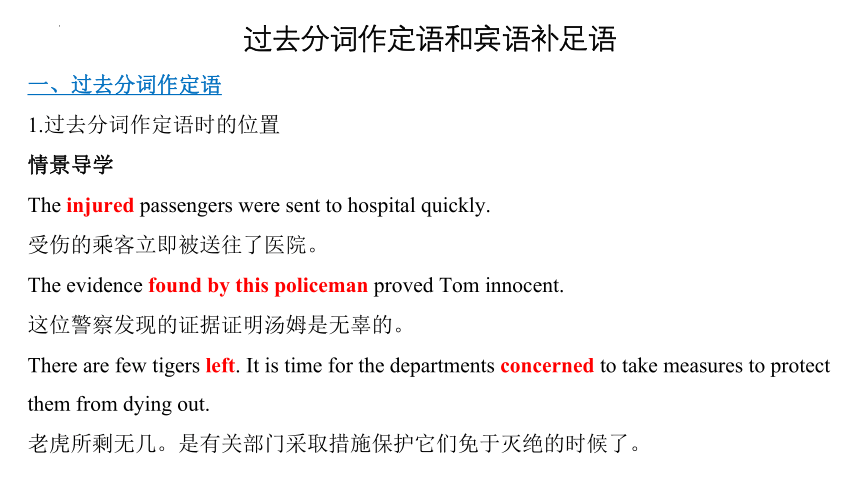 | |
| 格式 | pptx | ||
| 文件大小 | 132.4KB | ||
| 资源类型 | 教案 | ||
| 版本资源 | 人教版(2019) | ||
| 科目 | 英语 | ||
| 更新时间 | 2024-04-23 10:02:31 | ||
图片预览

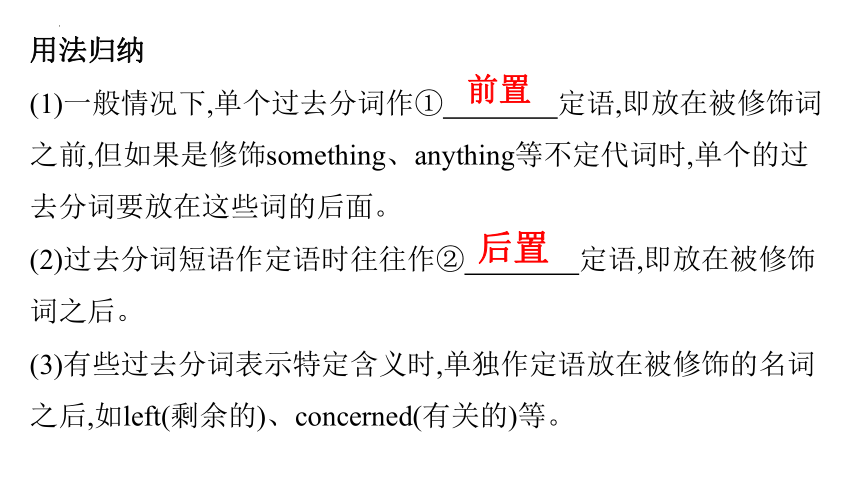
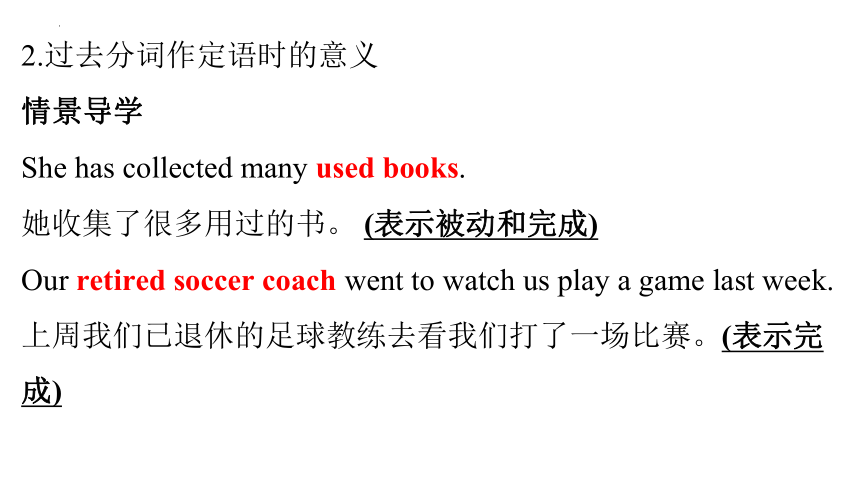
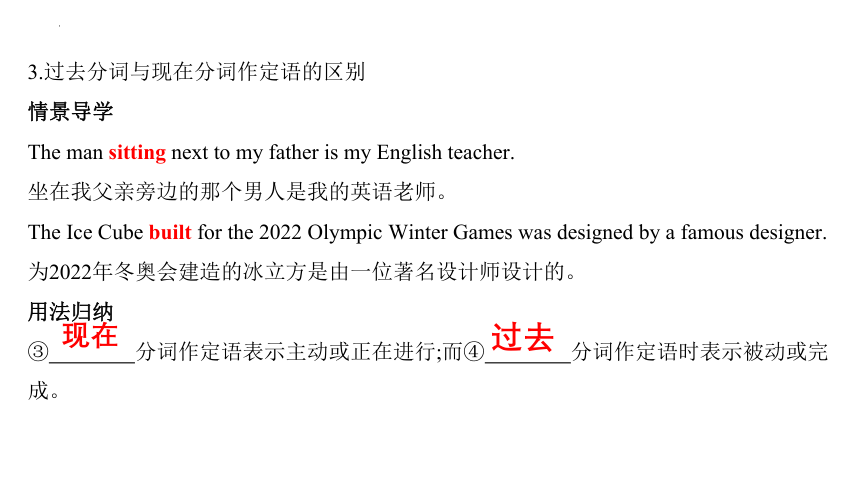
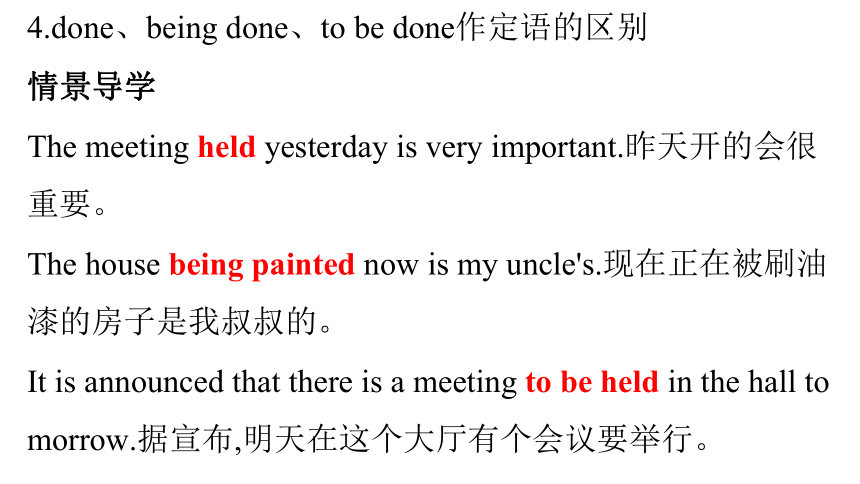
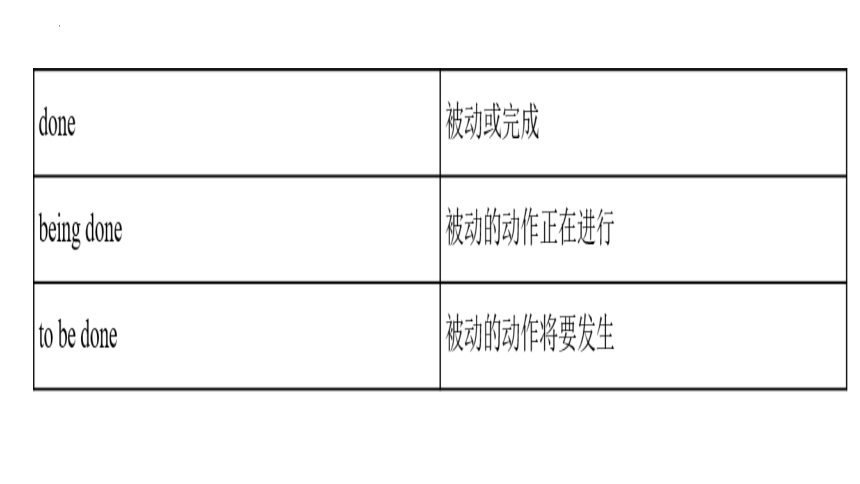
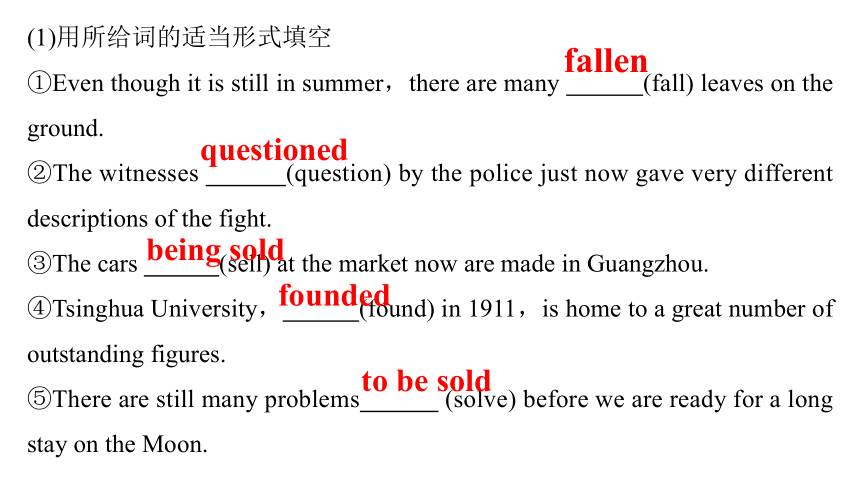
文档简介
(共15张PPT)
过去分词作定语和宾语补足语
一、过去分词作定语
1.过去分词作定语时的位置
情景导学
The injured passengers were sent to hospital quickly.
受伤的乘客立即被送往了医院。
The evidence found by this policeman proved Tom innocent.
这位警察发现的证据证明汤姆是无辜的。
There are few tigers left. It is time for the departments concerned to take measures to protect
them from dying out.
老虎所剩无几。是有关部门采取措施保护它们免于灭绝的时候了。
用法归纳
(1)一般情况下,单个过去分词作① 定语,即放在被修饰词之前,但如果是修饰something、anything等不定代词时,单个的过去分词要放在这些词的后面。
(2)过去分词短语作定语时往往作② 定语,即放在被修饰词之后。
(3)有些过去分词表示特定含义时,单独作定语放在被修饰的名词之后,如left(剩余的)、concerned(有关的)等。
前置
后置
2.过去分词作定语时的意义
情景导学
She has collected many used books.
她收集了很多用过的书。 (表示被动和完成)
Our retired soccer coach went to watch us play a game last week.
上周我们已退休的足球教练去看我们打了一场比赛。(表示完成)
3.过去分词与现在分词作定语的区别
情景导学
The man sitting next to my father is my English teacher.
坐在我父亲旁边的那个男人是我的英语老师。
The Ice Cube built for the 2022 Olympic Winter Games was designed by a famous designer.
为2022年冬奥会建造的冰立方是由一位著名设计师设计的。
用法归纳
③ 分词作定语表示主动或正在进行;而④ 分词作定语时表示被动或完成。
现在
过去
4.done、being done、to be done作定语的区别
情景导学
The meeting held yesterday is very important.昨天开的会很重要。
The house being painted now is my uncle's.现在正在被刷油漆的房子是我叔叔的。
It is announced that there is a meeting to be held in the hall tomorrow.据宣布,明天在这个大厅有个会议要举行。
(1)用所给词的适当形式填空
①Even though it is still in summer,there are many (fall) leaves on the ground.
②The witnesses (question) by the police just now gave very different descriptions of the fight.
③The cars (sell) at the market now are made in Guangzhou.
④Tsinghua University, (found) in 1911,is home to a great number of outstanding figures.
⑤There are still many problems (solve) before we are ready for a long stay on the Moon.
fallen
questioned
being sold
founded
to be sold
(2)同义句转换
⑥He is a teacher loved by his students.
→ .
⑦Near the window is a bookshelf which is filled with books.
→ .
He is a teacher who is loved by his students.
Near the window is a bookshelf filled with books.
二、过去分词作宾语补足语
1.特征及含义
情景导学
People are glad to see these puzzling problems solved within seven days.
人们很高兴看到这些令人费解的问题在七天内得到解决。
The poet found all the guests gone when he woke up.诗人醒来时发现所有的客人都走了。
用法归纳
(1)及物动词的过去分词作宾语补足语时,与宾语之间有逻辑上⑤ 关系,表示被动意义或已完成的意义,有时两者兼有。
(2)不及物动词的过去分词作宾语补足语时,与宾语之间没有逻辑上的被动关系,只表示宾语的状态。
被动
2.过去分词作宾语补足语的几种情况
(1)在感官动词(词组)后,如see、watch、observe、find、look at、hear、listen to、feel、notice等。
情景导学
I often hear the idioms spoken in conversations.
我经常在对话中听到这些习语。
The crowd found the town conquered by the military.
民众发现这个城镇被军队占领了。
用法归纳
如果宾语和宾补之间是逻辑上的⑥ 关系,用过去分词作宾语补足语。
注意:感官动词后也可用现在分词或省略to的不定式作宾语补足语。
I heard her singing an English song when I passed by her room yesterday.昨天经过她房间时,我听见她正在唱一首英文歌。(宾语和宾补之间是主动关系,表示“听到某人正在做某事”)
I heard her sing an English song just now.刚才我听见她唱了一首英文歌。(宾语和宾补之间是主动关系,表示“听到某人做某事的全过程”)
被动
(2)在使役动词后,如have、make、get、keep、leave等。
情景导学
I had my bike repaired the other day.
前几天我找人修理了我的自行车。
I made myself known to my new colleagues.
我让我的新同事了解我。
用法归纳
如果宾语和宾补之间是逻辑上的⑦ 关系,用过去分词作宾语补足语,意为“让/使……被做”。
注意:make后可用省略to的不定式作宾语补足语;have后可用省略to的不定式或现在分词作宾语补足语。
My teacher made me keep my eyes open for these mistakes.我的老师让我留心这些错误。(宾语和宾补之间是主动关系,意为“使某人做某事”)
My mother had me go to the shop and buy some salt.我的妈妈让我去商店买些盐。(宾语和宾补之间是主动关系,意为“使某人做某事”)
He had us laughing all through the meal.他让我们吃饭时一直笑个不停。(宾语和宾补之间是主动关系,意为“使某人一直做某事”)
被动
(3)在表示“希望、意愿”等意义的动词后,如like、want、wish、expect等。
情景导学
The poet wished his poems (to be) published as soon as possible.这位诗人希望他的诗尽快出版。
用法归纳
在表示“希望、意愿”等意义的动词后,如果宾语和宾补之间是逻辑上的被动关系,可省略过去分词前的to be,从而使语气显得更坚决。
注意:如果宾语和宾补之间是逻辑上的主动关系,则宾补应用to do形式。
I wish her to live a happy life.我希望她过幸福的生活。
(4)用在“with+宾语+宾语补足语”结构中。如果宾语和宾补之间是逻辑上的被动关系,应用过去分词作宾语补足语。
①Back from his two-year medical service in Africa,Dr.Lee was very happy to see his mother (take) good care of at home.
②Before driving into the city,you are required to get your car
(wash).
③Lucy has a great sense of humour and always keeps her colleagues
(amuse) with her stories.
④With the problem (solve),the quality has been improved.
⑤The boss wouldn’t like the topic (discuss) at the meeting.
⑥He walked into the room quietly in order not to make himself
(notice).
taken
washed
amused
solved
discussed
noticed
过去分词作定语和宾语补足语
一、过去分词作定语
1.过去分词作定语时的位置
情景导学
The injured passengers were sent to hospital quickly.
受伤的乘客立即被送往了医院。
The evidence found by this policeman proved Tom innocent.
这位警察发现的证据证明汤姆是无辜的。
There are few tigers left. It is time for the departments concerned to take measures to protect
them from dying out.
老虎所剩无几。是有关部门采取措施保护它们免于灭绝的时候了。
用法归纳
(1)一般情况下,单个过去分词作① 定语,即放在被修饰词之前,但如果是修饰something、anything等不定代词时,单个的过去分词要放在这些词的后面。
(2)过去分词短语作定语时往往作② 定语,即放在被修饰词之后。
(3)有些过去分词表示特定含义时,单独作定语放在被修饰的名词之后,如left(剩余的)、concerned(有关的)等。
前置
后置
2.过去分词作定语时的意义
情景导学
She has collected many used books.
她收集了很多用过的书。 (表示被动和完成)
Our retired soccer coach went to watch us play a game last week.
上周我们已退休的足球教练去看我们打了一场比赛。(表示完成)
3.过去分词与现在分词作定语的区别
情景导学
The man sitting next to my father is my English teacher.
坐在我父亲旁边的那个男人是我的英语老师。
The Ice Cube built for the 2022 Olympic Winter Games was designed by a famous designer.
为2022年冬奥会建造的冰立方是由一位著名设计师设计的。
用法归纳
③ 分词作定语表示主动或正在进行;而④ 分词作定语时表示被动或完成。
现在
过去
4.done、being done、to be done作定语的区别
情景导学
The meeting held yesterday is very important.昨天开的会很重要。
The house being painted now is my uncle's.现在正在被刷油漆的房子是我叔叔的。
It is announced that there is a meeting to be held in the hall tomorrow.据宣布,明天在这个大厅有个会议要举行。
(1)用所给词的适当形式填空
①Even though it is still in summer,there are many (fall) leaves on the ground.
②The witnesses (question) by the police just now gave very different descriptions of the fight.
③The cars (sell) at the market now are made in Guangzhou.
④Tsinghua University, (found) in 1911,is home to a great number of outstanding figures.
⑤There are still many problems (solve) before we are ready for a long stay on the Moon.
fallen
questioned
being sold
founded
to be sold
(2)同义句转换
⑥He is a teacher loved by his students.
→ .
⑦Near the window is a bookshelf which is filled with books.
→ .
He is a teacher who is loved by his students.
Near the window is a bookshelf filled with books.
二、过去分词作宾语补足语
1.特征及含义
情景导学
People are glad to see these puzzling problems solved within seven days.
人们很高兴看到这些令人费解的问题在七天内得到解决。
The poet found all the guests gone when he woke up.诗人醒来时发现所有的客人都走了。
用法归纳
(1)及物动词的过去分词作宾语补足语时,与宾语之间有逻辑上⑤ 关系,表示被动意义或已完成的意义,有时两者兼有。
(2)不及物动词的过去分词作宾语补足语时,与宾语之间没有逻辑上的被动关系,只表示宾语的状态。
被动
2.过去分词作宾语补足语的几种情况
(1)在感官动词(词组)后,如see、watch、observe、find、look at、hear、listen to、feel、notice等。
情景导学
I often hear the idioms spoken in conversations.
我经常在对话中听到这些习语。
The crowd found the town conquered by the military.
民众发现这个城镇被军队占领了。
用法归纳
如果宾语和宾补之间是逻辑上的⑥ 关系,用过去分词作宾语补足语。
注意:感官动词后也可用现在分词或省略to的不定式作宾语补足语。
I heard her singing an English song when I passed by her room yesterday.昨天经过她房间时,我听见她正在唱一首英文歌。(宾语和宾补之间是主动关系,表示“听到某人正在做某事”)
I heard her sing an English song just now.刚才我听见她唱了一首英文歌。(宾语和宾补之间是主动关系,表示“听到某人做某事的全过程”)
被动
(2)在使役动词后,如have、make、get、keep、leave等。
情景导学
I had my bike repaired the other day.
前几天我找人修理了我的自行车。
I made myself known to my new colleagues.
我让我的新同事了解我。
用法归纳
如果宾语和宾补之间是逻辑上的⑦ 关系,用过去分词作宾语补足语,意为“让/使……被做”。
注意:make后可用省略to的不定式作宾语补足语;have后可用省略to的不定式或现在分词作宾语补足语。
My teacher made me keep my eyes open for these mistakes.我的老师让我留心这些错误。(宾语和宾补之间是主动关系,意为“使某人做某事”)
My mother had me go to the shop and buy some salt.我的妈妈让我去商店买些盐。(宾语和宾补之间是主动关系,意为“使某人做某事”)
He had us laughing all through the meal.他让我们吃饭时一直笑个不停。(宾语和宾补之间是主动关系,意为“使某人一直做某事”)
被动
(3)在表示“希望、意愿”等意义的动词后,如like、want、wish、expect等。
情景导学
The poet wished his poems (to be) published as soon as possible.这位诗人希望他的诗尽快出版。
用法归纳
在表示“希望、意愿”等意义的动词后,如果宾语和宾补之间是逻辑上的被动关系,可省略过去分词前的to be,从而使语气显得更坚决。
注意:如果宾语和宾补之间是逻辑上的主动关系,则宾补应用to do形式。
I wish her to live a happy life.我希望她过幸福的生活。
(4)用在“with+宾语+宾语补足语”结构中。如果宾语和宾补之间是逻辑上的被动关系,应用过去分词作宾语补足语。
①Back from his two-year medical service in Africa,Dr.Lee was very happy to see his mother (take) good care of at home.
②Before driving into the city,you are required to get your car
(wash).
③Lucy has a great sense of humour and always keeps her colleagues
(amuse) with her stories.
④With the problem (solve),the quality has been improved.
⑤The boss wouldn’t like the topic (discuss) at the meeting.
⑥He walked into the room quietly in order not to make himself
(notice).
taken
washed
amused
solved
discussed
noticed
